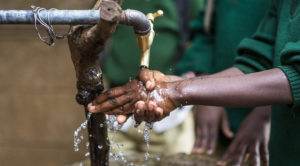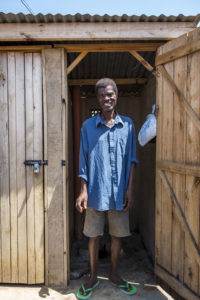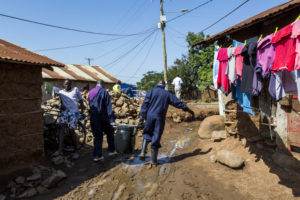The covid-19 pandemic this year has reminded us all of the vital importance of the basics of life that keep us healthy. It feels as if there are daily reminders about how easily disease transmission can happen from contaminated surface, to fingers to face. I feel as if I am constantly reminding myself not to touch my face – wipe an itchy eye, scratch a nose, and think how I’m brushing my hair out of the way.
These messages are integral to the well-known ‘F-Diagram’ (faeces-fingers-food) illustrating how diseases easily transmit from contaminated places.

Children from Pandpieri Primary School washing their hands
If you have access to a decent, safe, dignified toilet which safely keeps excreta separate from you and your family – along with a good place to wash your hands with soap and water, you’re among the fortunate globally. 4.2 billion people globally live without access to safely managed sanitation.
As if the covid-19 pandemic were not enough, climate change makes the future even more challenging. Extreme events such as intense rainfall can damage toilets and pits, and spread the contents creating misery and significant health risks. This video tells some of their story. Where we work in Kisumu, Kenya, this was the case just a few months ago. And this is in a context where our baseline study of three informal settlements in 2018 found 92 per cent of households are using pit latrines, and 69 per cent share with more than four households. A similar study in 2016 found that 43 per cent of toilets were in a poor condition: dirty or filled up. It is the dual challenge of lack of sanitation and the threats from a changing climate that are the focus this World Toilet Day (19th November).
In responding to and recovering from the pandemic, however, we have an opportunity to step to a better future. We should be working to ensure that communities have a better chance by getting the basics in place, including ensuring that everyone has access to a decent, safe toilet and a place to wash their hands. Done right, this will also improve resilience to the threats of climate change.

A new community toilet block in Kisumu, Kenya
However, this does require new financial commitments. This is something the global WASH community has been addressing recently. Finance Ministers from dozens of countries have been meeting online through the Sanitation and Water for All initiative to discuss ideas for how to channel money more effectively to the sector. A handbook gives ideas and examples of how to make public investment work.
Sadly it seems the need for use of Government funds is growing as aid funding appears to have been directly to health care at the expense of sectors like WASH in the first half of this year.
In Kisumu County, Kenya, we have been exploring how more and better financing could reach the sanitation sector under our Safe Pair of Hands project supported by UK Aid. While often investments in sanitation come from households or landlords themselves, there is still a need to support this with public investments in supporting infrastructure and services. This could be in the form of well-managed community toilets, safe pit emptying services, support for the most vulnerable households to construct toilets, or support builders to improve the quality of toilet construction.
Our analysis of the financing of sanitation in Kisumu County revealed that while 2.9 per cent of the budget was allocated to water supply, allocations for sanitation were negligible at around 0.5 per cent. The County has also been receiving declining amounts from central government to help it deliver on its WASH responsibilities.
A budget tracking exercise we carried out found that the vast majority of the budgets of the County Departments of Health and Water went towards new infrastructure construction, rather than preventative health and sanitation. Most of the funded tagged as ‘sanitation’ is actually spent on solid waste management.
To compound matters, the County also struggles to disburse the money allocated. Only 55 per cent of the approved budget for WASH was executed in Kisumu County during 2013-18. This was due to factors such as delays in procurement, delays in receipt of national finances, inadequate planning and the slow pace of large-scale infrastructure projects.

Pit emptiers in Kisumu, Kenya
Improving access to sanitation for those most in need, living in poor conditions in informal settlements, will require more money including money from public sources. However, this alone will not be enough. Our recommendations are not just about the amount, but the supporting systems and structures that will ensure budgets are spent efficiently for maximum impact. Our briefing paper, to be published in the coming weeks, calls for:
- Revisions to budget allocations for sanitation: tagging the County sanitation budget separately so it can be tracked more easily, increasing allocations, and targeting spending more effectively towards informal settlements
- Improvements in strategic and financial planning for sanitation: including finalizing County water and sanitation sector policies, and setting clear and ambitious targets which can steer budget allocations in the future
- Strengthening implementation capacity: to ensure that once budgets are allocated it is possible to spend the money on the projects they aim to support.
- Improvements in monitoring through ensuring all actors in Kisumu contribute to a common dataset of indicators, and social audit practices are mainstreamed giving communities greater opportunity to hold decision-makers to account.
A range of partners will need to work together to support the County Government. Together we can create a more resilient, cleaner and healthier future for everyone.